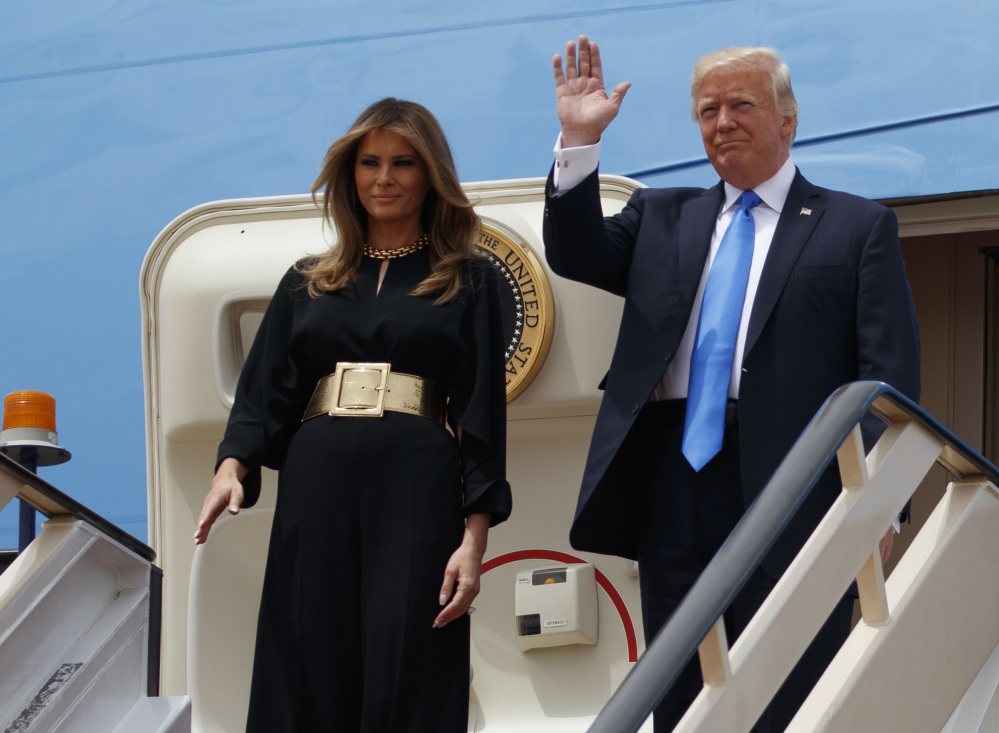RIYADH, Saudi Arabia — Donald Trump arrived Saturday in a country where women must secure a male guardian’s permission to get a passport, go to college and travel, and are forbidden from driving and can’t eat in certain restaurants.
But the new U.S. president, unlike his predecessors, was not expected to push the issue of human rights on his visit to Saudi Arabia despite the urging of some in the country.
“If he’s OK with human rights abuses, with the fact that women can’t drive, with the male guardianship system, with all the issues that we have in Saudi Arabia, then that really shows the type of leadership that he represents,” said Eman al Hafjan, a Riyadh resident who helped organize a demonstration of women driving cars in 2013.
As a candidate, Trump frequently criticized Saudi Arabia for its treatment of women and gays, but in recent months he has praised Saudi leaders and other regimes around the world with poor human rights records – the Philippines, China, Turkey and Egypt.
Saudi leaders, like others in the Persian Gulf, know that Trump is unlikely to press them about how they run their countries. Off the table are topics like democracy, political reform and gender equality.
“They had enough of that from Barack Obama and Hillary Clinton,” said Bruce Riedel, a former adviser to four presidents who is now senior fellow in the Center for Middle East Policy at the Brookings Institution in Washington.
Trump arrived in Riyadh on Saturday, with his wife, Melania, daughter Ivanka, and many of his White House staff. It was the first stop of his first foreign trip as president, during which he will also visit Israel, Italy and Belgium, with pledges to work with Saudi leaders to fight terrorism, boost economic development and counter nearby Iran.
In Saudi Arabia, where women must cover themselves from head to toe in public, there are no federal elections, no protests and no political parties or trade unions. The media are controlled by the government. People can worship only Islam in public.
The latest State Department Human Rights Report listed the official U.S. view of the kingdom’s human rights problems: “citizens’ lack of the ability and legal means to choose their government; restrictions on universal rights, such as freedom of expression, including on the internet, and the freedoms of assembly, association, movement, and religion; and pervasive gender discrimination and lack of equal rights that affected most aspects of women’s lives.”
Still no one expects Trump to deal with those issues.
“He’s not a human rights person. I think this is beyond his understanding,” said Aziza al Yousef, a human rights activist who was detained by police after she drove a car in 2014.
Al Yousef said she doesn’t care whether Trump talks about human rights because the issues are for Saudis to resolve. “It’s our issue and our government should have an open dialogue … to talk about our problem,” she said.
Jordan Tama, a professor in the School of International Service at American University in Washington, called Trump’s decision to highlight Saudi Arabia as the first country he visited as president “surprising and unfortunate” because of repression by the government.
“These are leaders who are not concerned very much about the rights of their people,” he said. “They have very repressive policies at home. … The rulers care much more about preserving their own power.”
President Barack Obama made human rights part of his message when he visited Saudi Arabia.
In 2009, Obama delivered a speech to the Muslim world from Cairo that pushed for self-determination, democracy and individual rights. Clinton, Obama’s secretary of state, helped seek the release of an activist, Manal al Sharif, who helped start a women’s right-to-drive campaign.
Human rights groups pushed Trump to address the issue at his meetings, saying not doing so would embolden further violations in a region where governments flout the rights of their own people, sometimes in the name of the fight against terrorism.
“Human rights are under continuous attack in the Gulf. Saudi Arabia and other gulf countries have been using counterterrorism as an excuse to ruthlessly crush and persecute critics, peaceful dissidents and human rights defenders,” said Margaret Huang, executive director of Amnesty International USA.
Last year, Trump posted a message on his Facebook page that said Saudi Arabia wants “women as slaves and to kill gays.”
Later, during a presidential debate, he said the Saudis were “people that push gays off buildings” and “kill women and treat women horribly.”
But Trump’s aides said he doesn’t believe that pushing American values gets results in other nations. The White House did not mention human rights in its account of a meeting between Trump and the deputy crown prince in March in Washington.
“Either he doesn’t believe in human rights or he doesn’t understand them, doesn’t care,” said Ara Alhaidar, a college professor in the Saudi capital. “Let’s pretend he does bring it up, it’s just to say, ‘check, we did this.’ I don’t think there is going to be any sincere efforts to make any kind of meaningful change.”
Send questions/comments to the editors.



Success. Please wait for the page to reload. If the page does not reload within 5 seconds, please refresh the page.
Enter your email and password to access comments.
Hi, to comment on stories you must . This profile is in addition to your subscription and website login.
Already have a commenting profile? .
Invalid username/password.
Please check your email to confirm and complete your registration.
Only subscribers are eligible to post comments. Please subscribe or login first for digital access. Here’s why.
Use the form below to reset your password. When you've submitted your account email, we will send an email with a reset code.